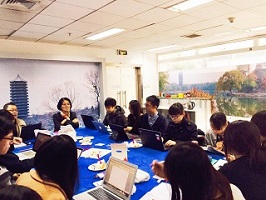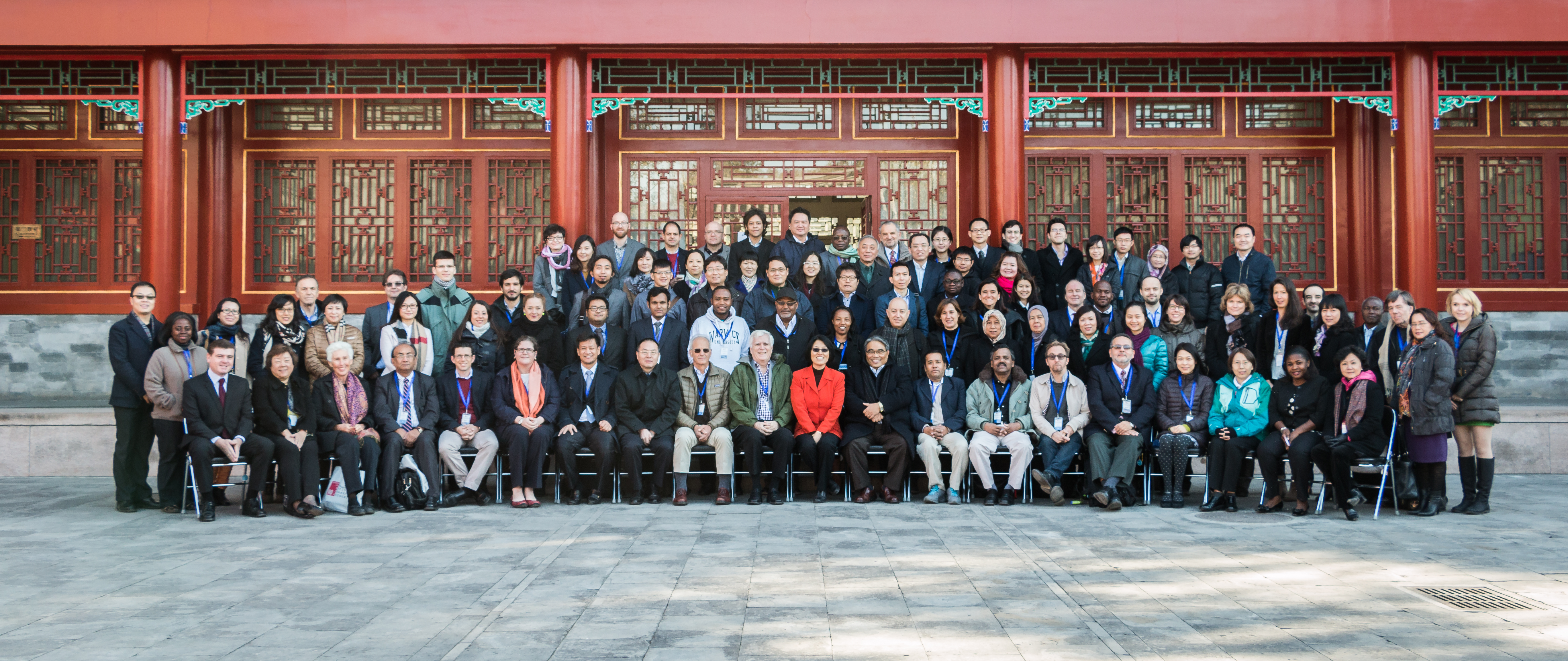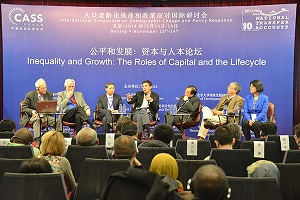NTA10


Tenth Meeting of the Working Group on Macroeconomic Aspects of Intergenerational Transfers: Beijing, China, 10 - 14 November 2014

Participants in Tenth NTA Meeting, Beijing, November 2014
The tenth NTA meeting included a one-day conference in which member presented their latest research findings and a one-day International Symposium on Demographic Change and Policy Response. The meeting also included a three-day workshop with training sessions for both new and more experienced NTA members. This website gives the agenda for these events with summaries of presentations, presentation slides, and information about the presenters.
Conference: Presentations of NTA research (Thursday 13 November 2014)
Welcoming remarks
Chair: Ling Li, Professor of Economics, National School of Development, Peking University
Speakers: Juwei Zhang (Director, Institute of Population and Labor Economics, Chinese Academy of Social Sciences); Ronald Lee (Professor of the Graduate School and Founding Director, Emeritus, Center for the Economics and Demography of Aging, University of California Berkeley); Andrew Mason (Professor of Economics, University of Hawaii - Manoa, and Senior Fellow, East-West Center)
Development of NTA
Chair: Ling Li, Professor of Economics, National School of Development, Peking University
Development of NTA (Sang-Hyop Lee)
Session One: Demographic transition and the macro economy (Chair: Jan W. van Tongeren)
Do changing population age distributions and NTA profiles drive macroeconomic change? A decomposition analysis (Ronald Lee)
Demographic transition and economic growth in Benin (Barthélémy Biao)
Age structure changes and economic growth in Vietnam (Pham Ngoc Toan)
Session Two: Demographic transition and the demographic dividend (Chair: Amy Tsui)
China's age of abundance: An update (Wang Feng, Shen Ke, Li Ding, and Yong Cai)
First demographic dividend and migration in El Salvador: How much have we lost? (Werner Peña) About Werner Peña
Session Three: Fiscal and public transfers (Chair: Nicholas McTurk)
Public sector and population aging (Andrew Mason)
Are current tax and spending regimes sustainable in developing Asia (Sang-Hyop Lee) About Sang-Hyop Lee
Social insurance transfers in Poland (Agnieszka Chłoń-Domińczak)
Session Four: Lifecycle deficit in general (Chair: Robert Gal)
National Transfer Accounts for Turkey (Nazli Sahanogullari)
How the lifecycle deficit is financed in Senegal (Latif Dramani, Fahd Ndiaye and Ouarmé Alaya)
Private consumption in Taiwan, 1981-2011 (Kevin Hsieh, Nicole Mun Sim Lai, and An-Chi Tung)
Session Five: Gender inequality and effect (Chair: Edgard Rodriguez)
Who benefits from women's invisible work in India (Laishram Ladusingh)
Counting South African women's work (Morné Oosthuizen)
Session Six: Health and human capital
Optimal revenue structure of public health insurance: Political economy approaches (Young Jun Chun)
Education, lifetime labor supply, and mortality improvements (Miguel Sanchez-Romero)
Session Seven: Public Transfer Transition (Chair: An-Chi Tung)
Thailand fiscal projections (Suphannada Lowhachai and Sang-Hyop Lee)
The effect of public transfers on private transfers in Korea between 2006 and 2011 (Namhui Hwang)
Benefit incidence of public transfers: Evidence from China (Shen Ke, Wang Feng, and Cai Yong)
Session Eight: Time Use and Methodology Development (Chair: Morné Oosthuizen)
Can we measure time consumption for unpaid work? An analysis for European countries (Marina Zannella)
Bayesian estimation in NTA frameworks (Jan W. van Tongeren and Arjan Bruil)
Four levels of intergenerational indicators (Lili Vargha and Robert I. Gal)
Comparison of internal rates of return from intergenerational transfer systems (Michael R.M. Abrigo)
International Symposium on Demographic Change and Policy Response (Friday 14 November 2014)
Opening remarks (Dan Kong, Former Chairman, CITIC Group)
Keynote speeches
Capital in the twenty-first century (Thomas Piketty, Professor of Economics, Paris School of Economics)
Thomas Piketty's remarks on NTA (https://www.youtube.com/watch?v=W4JJDFyG-p4)
Thomas Piketty's remarks on gender (https://www.youtube.com/watch?v=ZaRQ2cfx7Rg)
Is low fertility and rapid population aging really a problem? (Andrew Mason, Professor of Economics, University of Hawaii - Manoa, and Senior Fellow, East-West Center)
Demographic Dividend: Supply-side view and evidence on Chinese growth (CAI Fang, President, Chinese Academy of Social Sciences)
Aging: A celebration, a challenge, and an opportunity (Arie Hoekman, Representative of UNFPA China)
Economic dependency ratios in a comparative European setting: National transfer accounts and the AGENTA Project (Alexia Furnkranz-Prskawetz, Deputy Director and Research Group Leader, Vienna University of Technology and Vienna Institute of Demography, Austrian Academy of Sciences)
Furnkranz-Prskawetz presentation
Family and economic policy in a context of changing gender roles (Gretchen Donehower)
Donehower keynote presentation
Panel discussions
Inequality and growth: The roles of capital and the lifecycle
Moderator: Ronald Lee, Professor of the Graduate School and Founding Director, Emeritus, Center for the Economics and Demography of Aging, University of California Berkeley
Panelists: Fang Cai (Vice President, Chinese Academy of Social Sciences); Zhiyuan Cui (Professor, School of Public Policy and Management, Tsinghua University); Ping Huang (Director, Institute of European Studies, Chinese Academy of Social Sciences); Ling Li (Professor of Economics, National School of Development, Peking University); Andrew Mason (Professor of Economics, University of Hawaii - Manoa, and Senior Fellow, East-West Center); Thomas Piketty (Professor of Economics, Paris School of Economics)
Experience and expectations using the Demographic Dividend framework to advance development policy
Moderator: Jose “Oying” Rimon, Director, Bill & Melinda Gates Institute for Population and Reproductive Health, Johns Hopkins Bloomberg School of Public Health
Panelists: Eugenia Amporfu (Chair, Economics Department, Kwame Nkrumah University of Science and Technology); Sahlu Haile (Sub-Saharan Regional Advisor, David and Lucile Packard Foundation); Fasli Jalal (Chairman, National Family Planning Coordinating Board, Indonesia); Nicholas McTurk (Technical Specialist, Population and Development Policy, UNFPA); Zhenzhen Zheng (Professor, Institute of Population and Labor Economics, Chinese Academy of Social Sciences)
Social security policy in aging societies
Moderator: Ling Li, Professor of Economics, National School of Development, Peking University
Panelists: Agnieszka Chłoń-Domińczak (Assistant Professor, Institute for Statistics and Demography, Warsaw School of Economics); Arie Hoekman (Representative of UNFPA China); Ronald Lee (Professor of the Graduate School and Founding Director, Emeritus, Center for the Economics and Demography of Aging, University of California Berkeley); Haichao Lei (Vice Director, Beijing Municipal Commission of Health and Family Planning); Juwei Zhang (Director, Institute of Population and Labor Economics, and Director, Research Center for Labor and Social Security, Chinese Academy of Social Sciences)
Training Workshops for NTA Members (Monday - Wednesday, 10 - 12 November 2014)
Monday 10 November 2014
Welcome session (Ling Li, Qiulin Chen, Andrew Mason, and Ronald Lee)
Track A
Lecture: Orientation (Gretchen Donehower) Orientation Gretchen Donehower About Gretchen Donehower
Lab: Data orientation, getting started (Gretchen Donehower) About Gretchen Donehower
Lecture: NTA and the macro economy (Andrew Mason) NTA and the macro economy About Andrew Mason
Lab: Macro controls (Michael Abrigo) About Michael Abrigo
Track B
New research and open agenda (Ronald Lee)
Policy-relevant indicators (Robert Gal)
Time use and gender: Hands-on workshop (Gretchen Donehower) Donehower Time Use About Gretchen Donehower
Tuesday 11 November 2014
Track A
Lecture: Lifecycle deficit (Nicole Mun Sim Lai) About Nicole Mun Sim Lai
Lab: Lifecycle deficit (Nicole Mun Sim Lai) About Nicole Mun Sim Lai
Lecture: Transfers (Gretchen Donehower) Donehower Transfers About Gretchen Donehower
Lab: Transfers (Gretchen Donehower)About Gretchen Donehower
Track B
Generational accounts (Young Jun Chun) Chun Generational Accounts About Young Jun Chun
Time use and gender (Gretchen Donehower) Donehower Time Use2 About Gretchen Donehower
Wealth accounts (Ronald Lee and Andrew Mason) About Andrew Mason
Bequests (Miguel Sánchez Romero) Sanchez Romero bequests presentation About Miguel Sánchez Romero
Wednesday 12 November 2014
Track A
Lecture: Asset-based reallocations (Jože Sambt) About Jože Sambt
Lab: Asset-based reallocations (Gretchen Donehower) About Gretchen Donehower
Workshop: Communicating NTA results to policymakers (Sidney B. Westley) Westley presentation About Sidney Westley
Track B
Fiscal impacts (Andrew Mason) About Andrew Mason
Regional meetings (regional coordinators)
Inequality (Sang-Hyop Lee) Sang-Hyop Lee presentation on NTA by socio-economic status About Sang-Hyop Lee
Host Institution
The meeting was held at the National School of Development, which is based with the China Center for Economic Research (CCER) at Peking University. The National School of Development is a scientific research and educational institution focusing on the comprehensive study of social sciences. The School is committed to the internationalization, standardization and localization of social science study in China and to innovation in disciplinary systems, academic perspectives and research methods.
Thanks to the faculty and students of the National School of Development, who provided excellent organizational support and assistance to all of us who attended the meeting. In particular, thanks to Professor Ling LI and all her excellent helpers: Qiulin CHEN, Xueping SUN, Ruifeng LI, Yujie HE, Chunyu YANG, Hongchun ZHAO, Hongqiao FU, Wei HAN, Yun CAI, Nan GUAN, Ju WANG, Zihao CHEN, Yuxi HU, Zhen HU, Xinwei GAO, Jiajia PAN, Yuqi TA, Zhongda WANG and Yifan WEI. You folks are the greatest!
Available for Download
Informal photos from the conference (members only)
Co-sponsors
This meeting was co-sponsored by
- Center for the Economics and Demography of Aging, University of California Berkeley
- East-West Center
- Institute of Population and Labor Economics, Chinese Academy of Social Sciences
- National School of Development, Peking University





